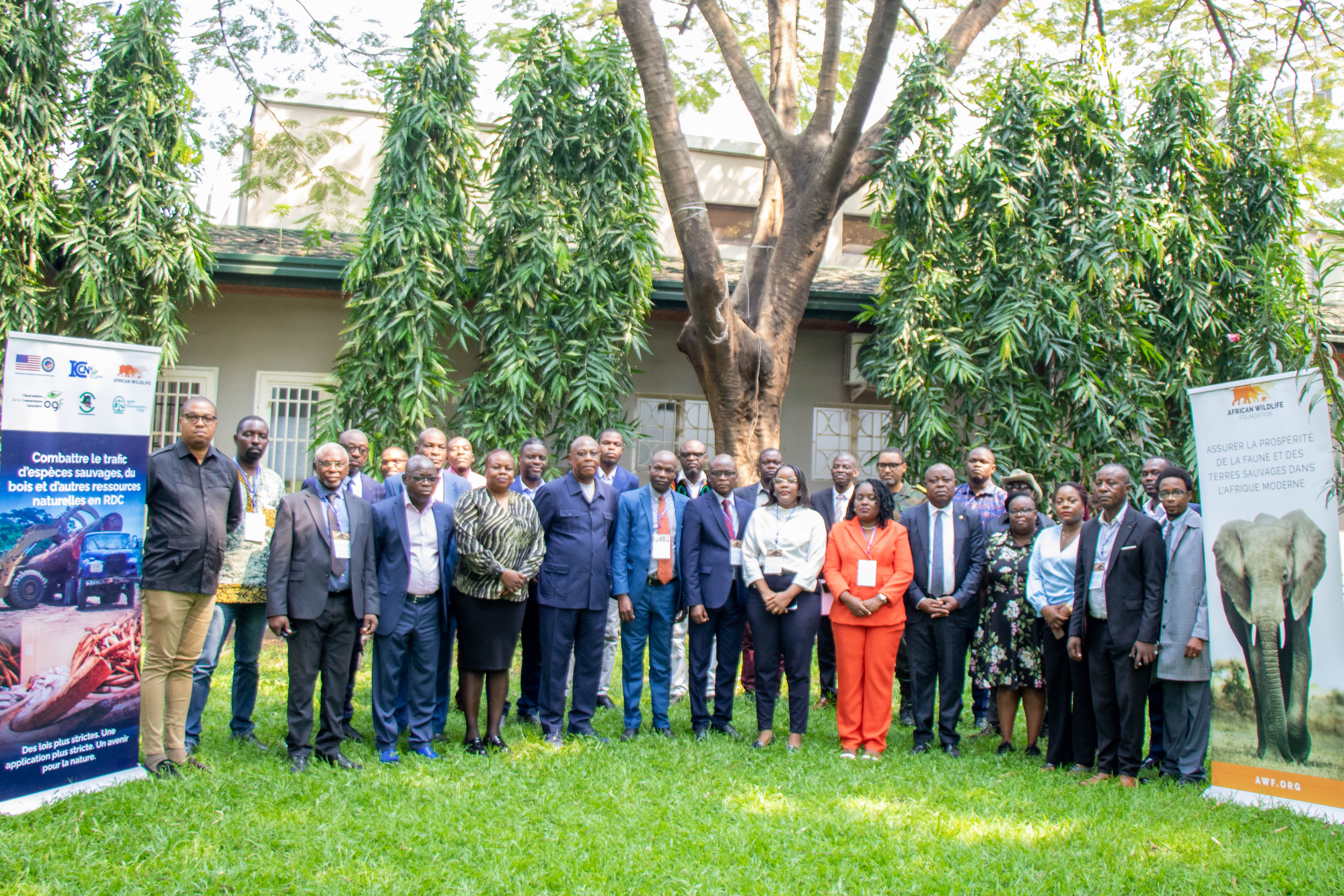AWF, Angola and Partners Join Forces to Tackle Wildlife and Timber Trafficking in the DRC

Group photo with all workshop participants
General Inquiries
Tel:+254 711 063 000
Ngong Road, Karen, P.O. Box 310
00502 Nairobi, Kenya
Kinshasa, June 20, 2025 – In response to the alarming rise in wildlife, timber, and natural resource trafficking across Central Africa, the African Wildlife Foundation (AWF), in close partnership with JUREC, Conserv Congo, OGF, the Congolese Institute for Nature Conservation (ICCN), and Angola’s National Institute for Biodiversity and Conserved Areas (INBAC), has officially launched the project “Countering Wildlife, Timber and Other Natural Resource Trafficking in the DRC” during a high-level workshop in Kinshasa.
“Strengthening borders is one of the appropriate solutions to win this fight”, believe Paulin Tshikaya, Technical and scientific director at ICCN. “The reason why wildlife trafficking is huge in DRC borders is simple: borders are malleable. We therefore call for sincere cooperation from all services, without which nothing will be achieved. What we are currently losing to this trafficking is nothing compared to what we could lose tomorrow if no action is taken.
This transboundary initiative financed by Bureau of International Narcotics and Law Enforcement Affairs (INL) aims to fortify regional law enforcement cooperation and empower local communities to resist the grip of organized environmental crime. It responds to mounting concerns around the Lobito Corridor, an emerging trade artery that, while spurring economic opportunity, has inadvertently exposed vulnerable forest ecosystems and endangered species to intensifying trafficking risks.
“This project is not only timely, it is essential,” said Antoine Tabu Senga, AWF Country Coordinator in the DRC. “With organized networks capitalizing on porous borders and limited oversight, we must match their coordination with even greater resolve, science-based strategies, and local engagement.”
The launch workshop brought together senior stakeholders from both the DRC and Angola, including ministries of Justice, Transport, Environment, and Customs. Discussions centered on: Introducing the project’s vision, technical teams, and implementation framework, Presenting AWF’s community engagement and law enforcement protocols —Mapping regional enforcement priorities in the Maringa-Lopori-Wamba landscape and along the Lobito Corridor.
“AWF has conducted deep analysis across its African programs and identified wildlife trafficking as a critical blind spot,” added Antoine Tabu Senga. “The DRC’s strategic location and rich biodiversity make it both a target and a leader in this fight. This project is our collective response to that challenge.”
Joe Kassongo, Senior Legal Officer at AWF, emphasized the importance of cross-border collaboration: “Our partnership with INBAC is vital. It will allow law enforcement agents from both countries to meet regularly, share intelligence, and jointly dismantle trafficking networks along the Lobito Corridor and other key borders.”
Filomena Ilda Tumba, Head of the Advisory Services Department at the Angolan Ministry of the Environment echoed this commitment: “Angola joins this initiative with a firm resolve to strengthen regional cooperation against the trafficking of wildlife, timber, and other natural resources. Together, we can build a safer, more sustainable future for our shared ecosystems.”
Civil society partners are delighted to see the local community actively involved in the implementation of this project. Tey are assume that this project It’s not just about stopping illegal trade, it’s about restoring trust between communities, authorities, and conservation actors. That’s how long-term change takes root.
JUREC’s Executive Director, Félix Credo Lilakako said “local communities are often the first to witness the impacts of trafficking. This project gives them a voice and a role in shaping enforcement strategies that are both effective and just.”
This launch marks more than the start of a project; it signals a new era of cross-border solidarity. With national institutions, civil society, and conservation leaders rallying across the DRC and Angola, a united front is forming against the tide of natural resource trafficking.
The enthusiasm and commitment witnessed at this workshop reflect a growing momentum: one where communities, governments, and partners work hand in hand to protect the ecological wealth of Central Africa.
About the African Wildlife Foundation
The African Wildlife Foundation is the primary advocate for protecting wildlife and their habitats as an essential part of a modern and prosperous Africa. Founded in 1961 during the African independence movement to build our capacity to steward our natural resources, AWF articulates a uniquely African vision. It bridges science, education, public policy, and field programs to demonstrate the benefits of conservation and build a future for Africa where people and wildlife thrive.